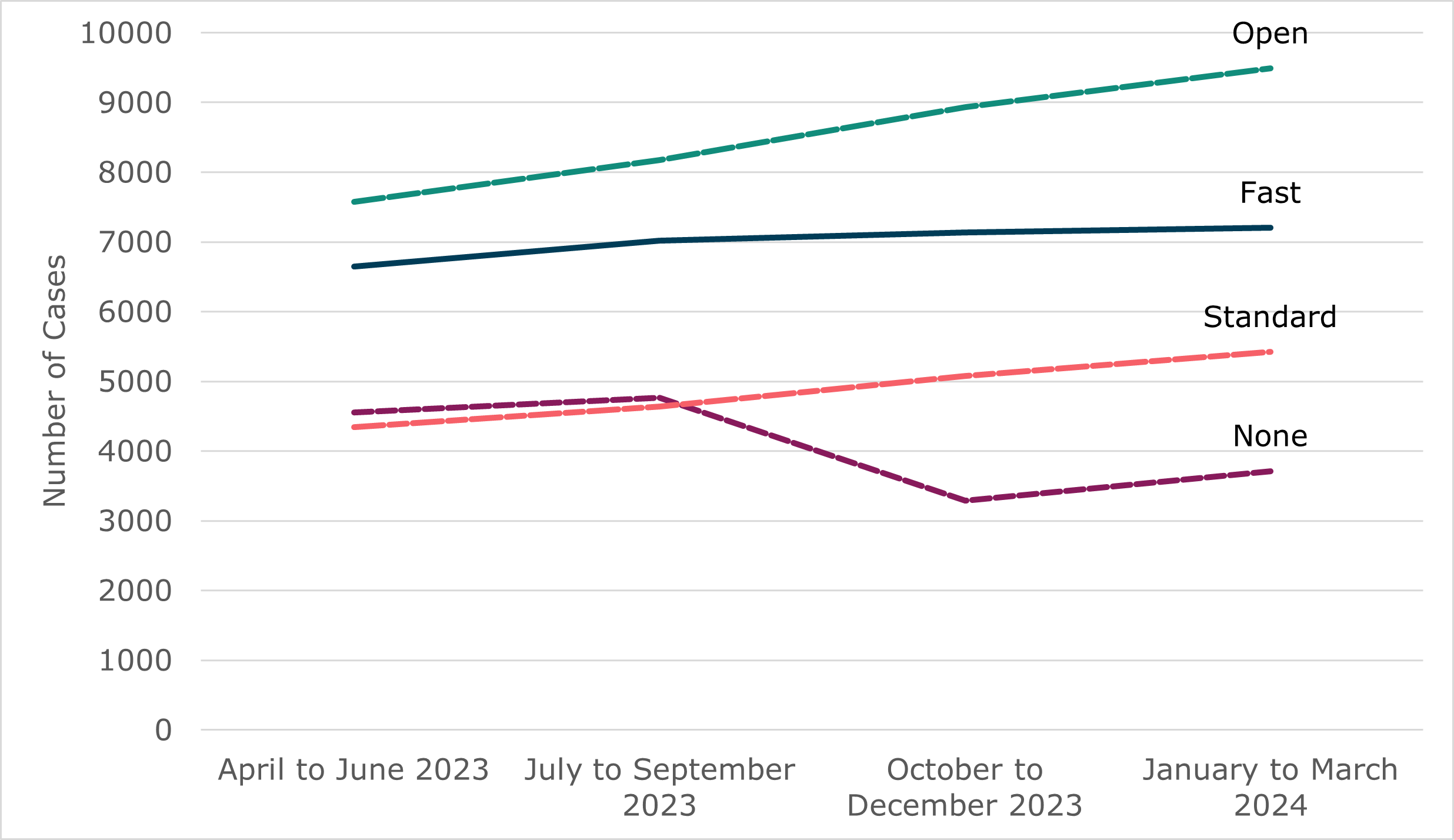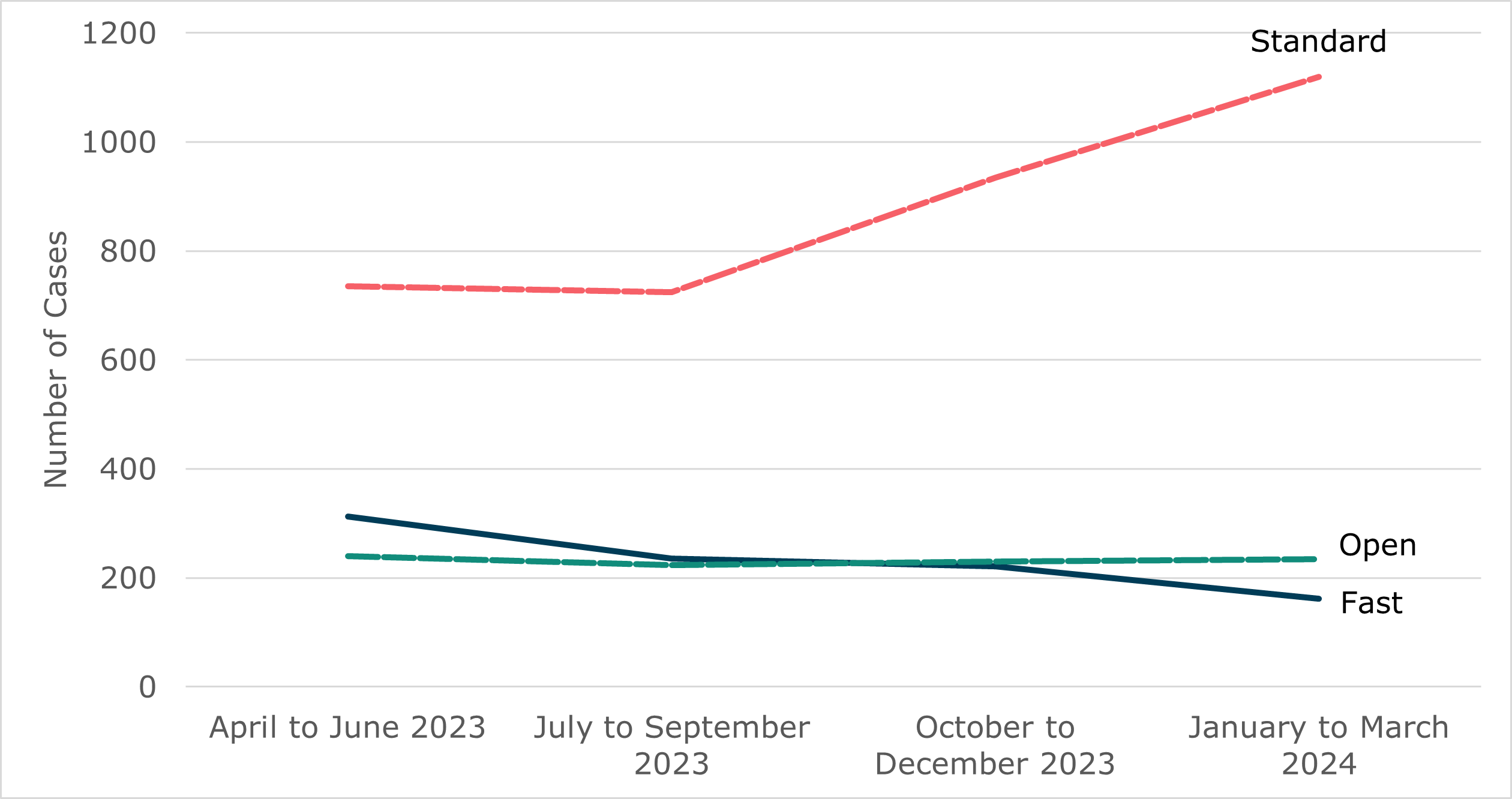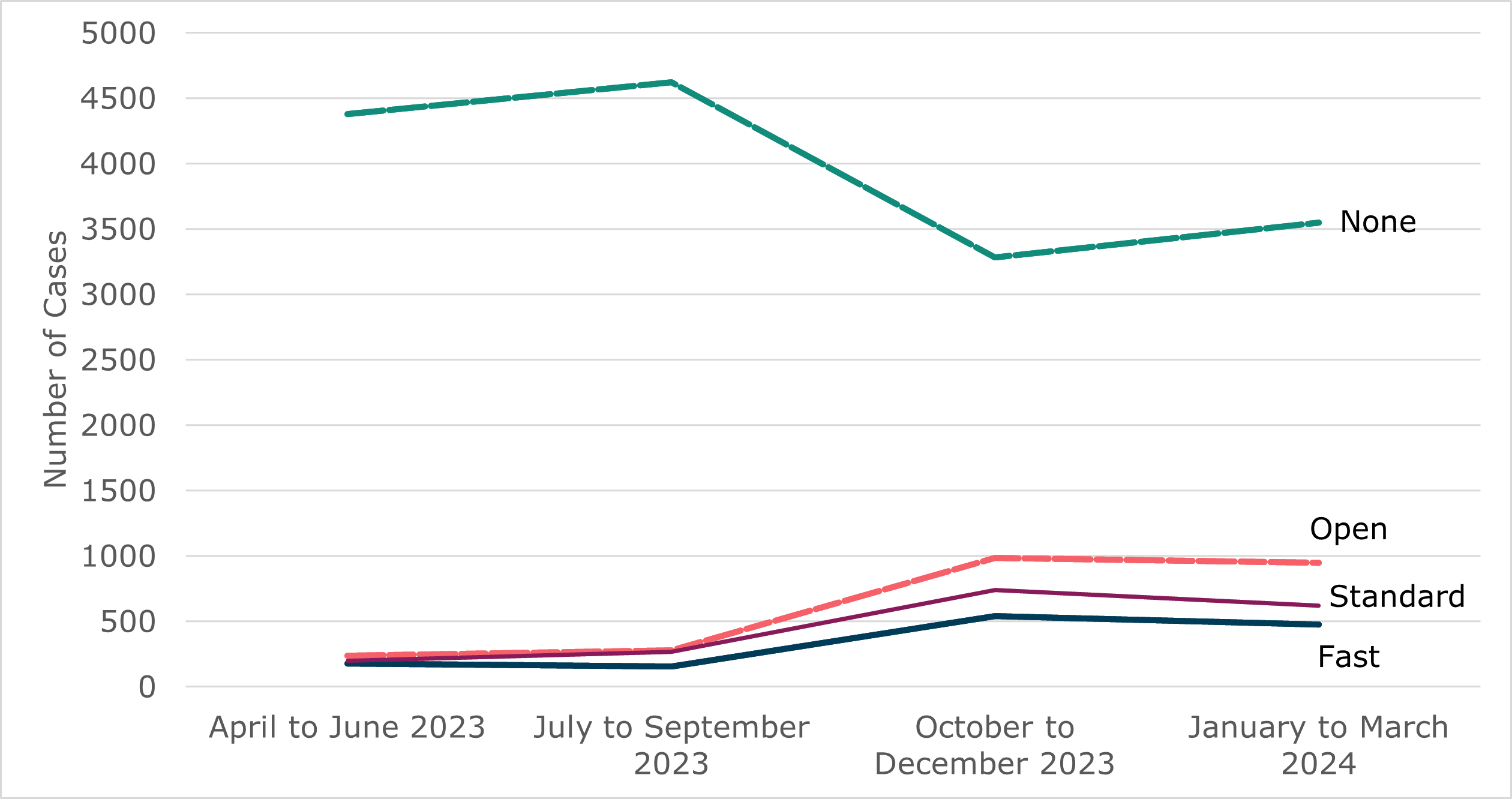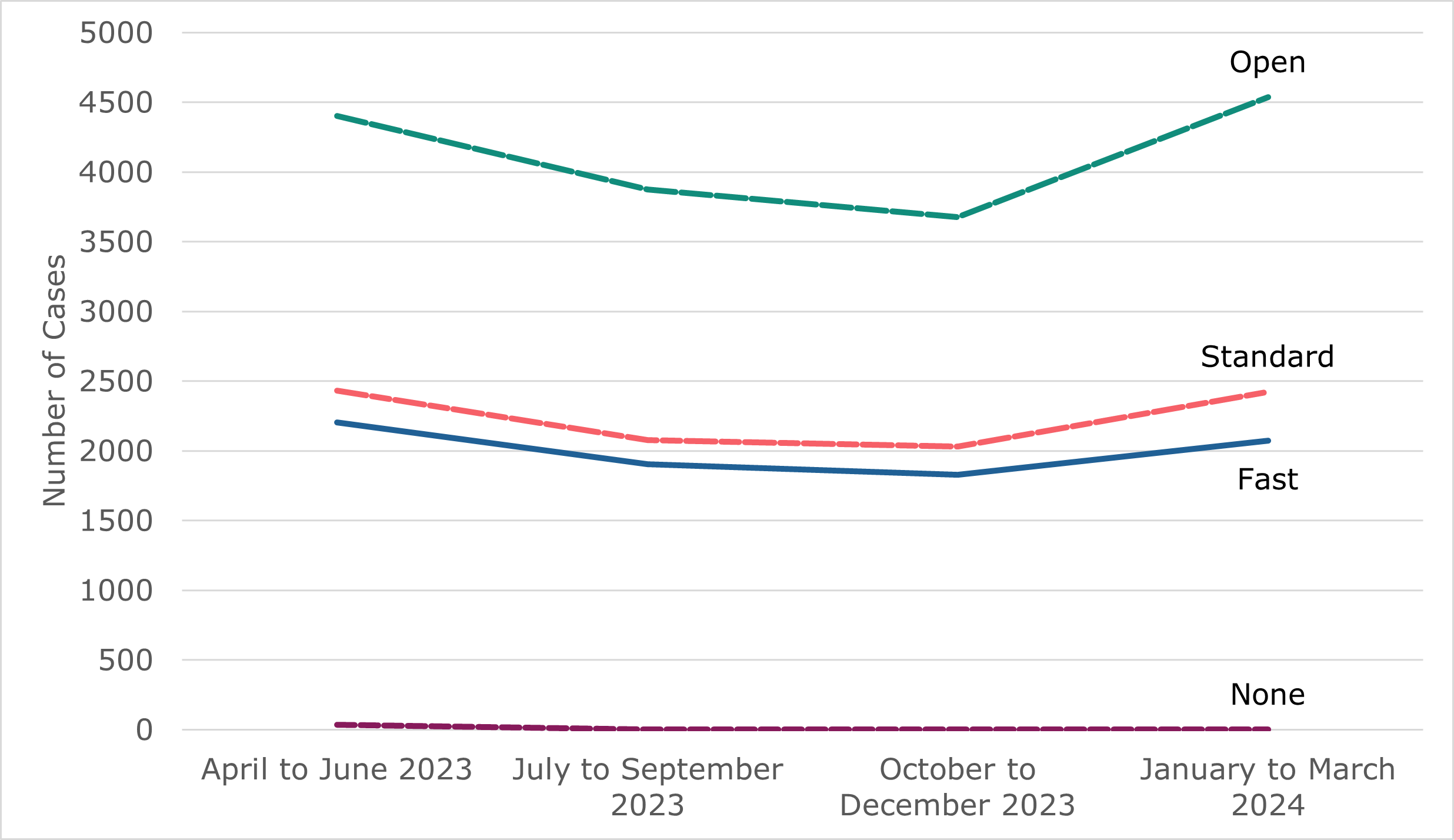1. Main points
- Fast track group cases made up 34% of group cases in January to March 2024, rising from 26% in October to December 2023, but lower in comparison to 35% in July to September 2023, and 50% in April to June 2023.
- Open track cases accounted for the largest number of individual cases between January and March with regards to employee-led early conciliation notification numbers, making up 37% of cases.
- Standard track cases accounted for 74% of employer-led cases for January to March; this has increased each quarter from April 2023 to March 2024.
- 68% of early conciliation notifications did not progress to employment tribunal between October to December, dropping slightly from 69% between July to September.
- Open track cases made up around 50% of employment tribunal claim form (ET1) receipts within each of the 4 quarters between April 2023 and March 2024.
- 76% of employment tribunal cases received did not go on to have a hearing across each of the 4 quarters between April 2023 to March 2024.
2. Early conciliation notifications
When an employee wants to make a claim against their employer at an employment tribunal, in most cases they must notify Acas first. Acas offers early conciliation to try to reach an agreement between the employee and employer and avoid the employee making a claim to an employment tribunal.
In some circumstances, the employer may approach Acas to help resolve a potential dispute. This can also be handled using early conciliation.
Early conciliation notifications can be made:
- by an individual against their employer
- on behalf of a group against their employer
- by an employer where a dispute concerning staff requires resolution
Employee-led early conciliation notifications
Around 95% of all early conciliation notifications came from employees across each of the 4 quarters between April 2023 and March 2024.
Open track cases had the largest number of group cases with an assigned track in January to March 2024, accounting for 49% of cases. In comparison, group cases with no track assigned held the highest proportion of cases in October to December 2023, accounting for 33% of group cases.
Open track cases had the largest number of individual cases, accounting for 37% of all employee-led cases in January to March 2024 and October to December 2023, compared to 33% in both July to September 2023 and April to June 2023.
| Case type | Track | April to June 2023 | July to September 2023 | October to December 2023 | January to March 2024 | Total |
|---|---|---|---|---|---|---|
| Individual | Fast | 6646 | 7015 | 7133 | 7202 | 27996 |
| Individual | None | 4554 | 4766 | 3287 | 3712 | 16319 |
| Individual | Open | 7571 | 8172 | 8931 | 9490 | 34164 |
| Individual | Standard | 4345 | 4636 | 5078 | 5420 | 19479 |
| Total | - | 23116 | 24589 | 24429 | 25824 | 97958 |
| Group | Fast | 238 | 144 | 141 | 219 | 742 |
| Group | None | 53 | 50 | 180 | 24 | 307 |
| Group | Open | 99 | 128 | 130 | 309 | 666 |
| Group | Standard | 90 | 84 | 91 | 84 | 349 |
| Total | - | 480 | 406 | 542 | 636 | 2064 |
| Claimants within groups | - | 22384 | 18240 | 22254 | 24680 | 87558 |

Employer-led early conciliation notifications
Employer-led early conciliation notifications made up around 6% of early conciliation notifications in the most recent 2 quarters from October 2023 to March 2024.
Standard track cases had the largest number of employer-led notifications in all 4 quarters from April 2023 to March 2024. This has increased from the previous quarter, accounting for 74% of cases in January to March 2024, compared to 67% in October to December 2023, 61% in July to September 2023, and 57% in April to June 2023.
| Track | April to June 2023 | July to September 2023 | October to December 2023 | January to March 2024 | Total |
|---|---|---|---|---|---|
| Fast | 313 | 235 | 221 | 162 | 931 |
| None | [suppressed] | [suppressed] | [suppressed] | [suppressed] | [suppressed] |
| Open | 240 | 223 | 230 | 234 | 927 |
| Standard | 735 | 724 | 934 | 1119 | 3512 |
| Total | 1288 | 1182 | 1385 | 1515 | 5370 |

3. Early conciliation notification outcomes
Some early conciliation notifications are not suitable for conciliation and the service is not mandatory so some claimants will refuse the offer.
Early conciliation cases not progressed to conciliation
In the 4 quarters from April 2023 to March 2024, just over 20% of early conciliation cases were closed without parties engaging in early conciliation. Most of these were cases with no track assigned which made up 63% of cases in January to March, up from 59% of cases in October to December, and down from 87% in July to September, and 88% in April to June. These are where Acas has not been able to get in touch with the claimant to gather enough information to assign a track, so this is to be expected.
Conversely, cases from all the assigned tracks that did not progress to conciliation increased in January to March 2024 compared to the previous 3 quarters.
It should be noted that around October 2023, changes were made to the notification form. These changes allowed users to select from more options as to the reason for their dispute. Their selection then determines the track for the case.
Fast track cases were the lowest proportion of the cases that did not progress to conciliation. Of cases with an assigned track, open track cases made up the highest proportion of cases that were not conciliated across each of the 4 quarters between April 2023 and March 2024.
| Track | April to June 2023 | July to September 2023 | October to December 2023 | January to March 2024 | Total |
|---|---|---|---|---|---|
| Fast | 178 | 153 | 542 | 475 | 1348 |
| None | 4381 | 4623 | 3285 | 3549 | 15838 |
| Open | 238 | 278 | 986 | 948 | 2450 |
| Standard | 199 | 265 | 738 | 620 | 1822 |
| Total | 4996 | 5319 | 5551 | 5592 | 21458 |
| Total closed | 24314 | 24719 | 24910 | 26157 | 100100 |
| % closed cases not conciliated | 21% | 22% | 22% | 21% |
- |

Settlement of early conciliation cases
Due to the potential time lag between an early conciliation certificate being issued and the corresponding ET1 reaching Acas, these data cannot be accurately reported until after a period of time has elapsed and so are 1 quarter behind all the other statistics in this bulletin. This table covers early conciliation, employee-led and group cases only, and is based on outcomes of cases received in April to December 2023.
Around 68% of cases did not lead to the submission of an ET1 throughout October to December, falling from 69% in July to September, but up from 66% in April to June 2023. Of those with an assigned track, the fast track cases were most likely not to progress to ET1. The proportion of cases that did not progress to tribunal dropped for all cases with an assigned track, but most markedly for standard track cases which dropped to 61% in October to December from 70% in July to September 2023.
| Track | Outcome | April to June 2023 | July to September 2023 | October to December 2023 | Total |
|---|---|---|---|---|---|
| Fast | Settled by Acas | 974 | 1055 | 1003 | 3032 |
| Fast | ET1 avoided | 5310 | 5643 | 5486 | 16439 |
| Fast | % did not progress to ET | 74% | 79% | 75% | - |
| None | Settled by Acas | [suppressed] | [suppressed] | [suppressed] | [suppressed] |
| None | ET1 avoided | 2551 | 2859 | 2907 | 8317 |
| None | % did not progress to ET | 99% | 60% | 99% | - |
| Open |
Settled by Acas | 1171 | 1252 | 1229 | 3652 |
| Open | ET1 avoided | 4736 | 5256 | 5253 | 15245 |
| Open | % did not progress to ET | 55% | 64% | 57% | - |
| Standard |
Settled by Acas | 802 | 841 | 839 | 2482 |
| Standard | ET1 avoided | 3018 | 3310 | 3248 | 9576 |
| Standard | % did not progress to ET | 58% | 70% | 61% | - |
| Total | Settled by Acas | 2947 | 3148 | 3071 | 9166 |
| Total | ET1 avoided | 15615 | 17068 | 16894 | 49577 |
| Total | % did not progress to ET | 66% | 69% | 68% | - |
4. Employment tribunal claim form (ET1) receipts
If a case is not resolved by early conciliation, the claimant can submit an ET1 form to make a claim to an employment tribunal. Conciliation can also be carried out at this stage to try to resolve the case without progressing to tribunal.
The highest level of ET1 receipts was received in open track cases, accounting for around 50% of all ET1 receipts in each of the 4 quarters between April 2023 and March 2024. The lowest proportion of ET1 receipts was received in cases with no track assigned, accounting for less than 1% of all ET1 receipts in each of the 4 quarters between April 2023 and March 2024.
| Track | April to June 2023 | July to September 2023 | October to December 2023 | January to March 2024 | Total |
|---|---|---|---|---|---|
| Fast | 2201 | 1905 | 1827 | 2073 | 5933 |
| None | 34 | [suppressed] | [suppressed] | [suppressed] | 34 |
| Open | 4401 | 3872 | 3676 | 4536 | 11949 |
| Standard | 2431 | 2077 | 2028 | 2423 | 6536 |
| Total | 9067 | 7854 | 7531 | 9032 | 33484 |

5. Employment tribunal claims outcomes
These data are based on cases that had an outcome within the quarters covered in this bulletin and do not correspond to the cases that were received in table 5.
76% of all employment tribunal cases in each of the quarters between April 2023 and March 2024 did not progress to a tribunal hearing. Of cases with an assigned track, open track cases were most likely to not progress to a hearing, with fast track cases most likely to progress to a hearing. Acas settled around 70% of the cases that did not progress to tribunal in January to March 2024, down from 73% in October to December 2023. This figure was 69% in July to September 2023, and 73% in April to June 2023. The remaining cases were withdrawn.
| Track | Outcome | April to June 2023 | July to September 2023 | October to December 2023 | January to March 2024 | Total |
|---|---|---|---|---|---|---|
| Fast | Settled by Acas | 645 | 732 | 640 | 682 | 2699 |
| Fast | Withdrawn | 403 | 466 | 401 | 417 | 1687 |
| Fast | % did not have hearing | 62% | 61% | 61% | 58% | - |
| None | Settled by Acas | [suppressed] | [suppressed] | [suppressed] | [suppressed] | [suppressed] |
| None | Withdrawn | [suppressed] | [suppressed] | [suppressed] | [suppressed] | [suppressed] |
| None | % did not have hearing | [suppressed] | [suppressed] | [suppressed] | [suppressed] | [suppressed] |
| Open | Settled by Acas | 2194 | 2160 | 2373 | 2219 | 8946 |
| Open | Withdrawn | 705 | 838 | 718 | 863 | 3124 |
| Open | % did not have hearing | 84% | 85% | 85% | 85% | - |
| Standard | Settled by Acas | 1034 | 977 | 1075 | 1030 | 4116 |
| Standard | Withdrawn | 343 | 415 | 411 | 387 | 1556 |
| Standard | % did not have hearing | 74% | 71% | 73% | 74% | - |
| Total | Settled by Acas | 3873 | 3869 | 4088 | 3931 | 15761 |
| Total | Withdrawn | 1451 | 1719 | 1530 | 1667 | 6367 |
| Total | % did not have hearing | 76% | 76% | 76% | 76% | - |
6. Glossary
Conciliation or conciliating
The process of negotiation when an Acas conciliator mediates between parties in an employment dispute to try and reach agreement without going to an employment tribunal.
Conciliator
A government official employed by Acas who mediates or conciliates between parties in an employment dispute.
Early conciliation
Acas service introduced in April 2014. Voluntary process of conciliating before a formal employment tribunal claim has been submitted with the aim of resolving the case. The prospective claimant submits an early conciliation notification to Acas, usually online, and Acas will then offer them early conciliation.
Early conciliation notification
Submission to Acas (usually online) required to begin conciliation.
Employment tribunal (ET)
Court of law charged with hearing cases within employment jurisdictions, although cases with monetary value may be heard elsewhere.
ET1
Form used by claimants to make a claim to an employment tribunal. The form is copied to Acas to allow ET1 conciliation to proceed until either the dispute is resolved, or a legal judgement is reached. It’s free to submit an ET1.
ET1 avoided
Disputes that, at the time of publication, had led to an early conciliation notification but an ET1 had not been submitted.
Post ET1 conciliation
Acas has a duty to attempt conciliation between the claimant and their employer once an ET1 has been submitted and passed to Acas. If a settlement can be reached or if the claimant agrees to withdraw their claim, the dispute is considered to be resolved. Otherwise, it will proceed to an employment tribunal hearing.
Group case
Cases which have been grouped together for conciliation because they are against the same employer and relate to the same dispute. 'Claimants in groups' are the number of claimants represented by these group claims.
Jurisdiction
Legal classification of the type of dispute a claim is made about. One case may contain more than one jurisdiction. For example, an unfair dismissal claim may also contain a claim under the Wages Act for unpaid wages. This could be changed in an employment tribunal.
Live case
Early conciliation notifications or ET1s still going through the conciliation process.
Track
How Acas loosely classes the complexity of each case, based on the jurisdictions in the ET1 form, or the suggested jurisdictions assigned to early conciliation notifications.
The 4 tracks are:
- fast track – straightforward cases mostly relating to money, such as unpaid wages
- standard track – cases that are more complicated than fast track and involve unfair dismissal or a related jurisdiction
- open track – the most legally complex cases with at least one type of discrimination or disclosure jurisdiction
- no track assigned – cases where insufficient information is available to assign indicative jurisdictions (for example, where parties cannot be contacted)
7. Quality
You can find more information in the methodology article and background quality reports on:
- strengths in the data
- limitations of the data
- appropriate uses of the data
- how the data were created
Comparison to annual report data
Acas's annual report includes early conciliation and employment tribunal data. Some of the data in our 2023 to 2024 annual report, due to be published later in summer 2024, is different to the data in this bulletin.
We have compared the data from this bulletin to those in the annual report to identify where there are differences. The data for this bulletin are taken 6 weeks after the end of the quarter, whereas the data for the annual report are taken 6 weeks after the end of the financial year. Relationships between the cases change over time. This means that we would not expect the data to be coherent between the two publications.
While the majority of changes were minor, there were some areas where the changes were more noticeable. A summary of the changes are listed below.
- There are around 1,750 fewer cases reported in this bulletin across all 4 quarters with regards to early conciliation case outcomes, which is a reasonable difference to the annual report figures as cases reported in the annual report will have had longer to receive an outcome.
- There are around 200 fewer cases reported in this bulletin with regards to employment tribunal case outcomes, which is to be expected for the same reason provided above.
- There are more individual early conciliation cases with assigned tracks in the annual report, particularly to open track. 876 cases had moved from having no track assigned to open track, accounting for 5.6% of cases that had moved as opposed to all cases. This is due to additional time passing, allowing further details on the cases to emerge and a track to be assigned.
- There are more employment tribunal cases with tracks assigned in the annual report compared to this bulletin, with 11,010 (17.5%) moving to fast track, 22,174 (35.2%) moving to open track, and 12,212 (19.4%) moving to standard track. These percentages only relate to the proportion of employment tribunal cases that had moved as opposed to all cases, and again reflects the difference in when the data cuts were taken.
